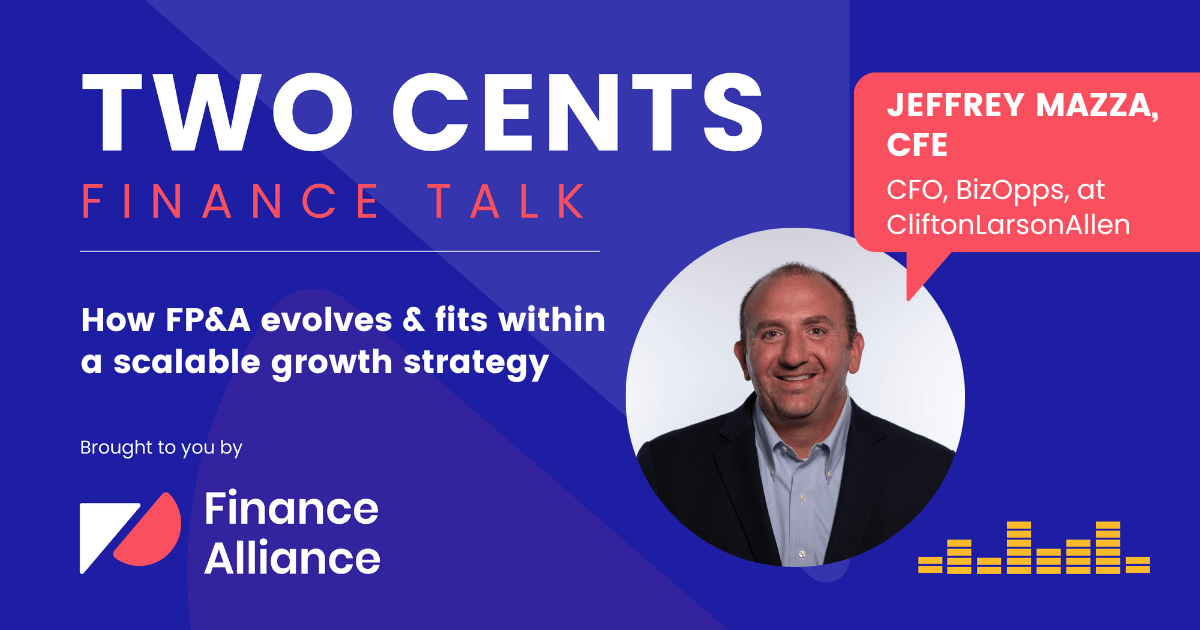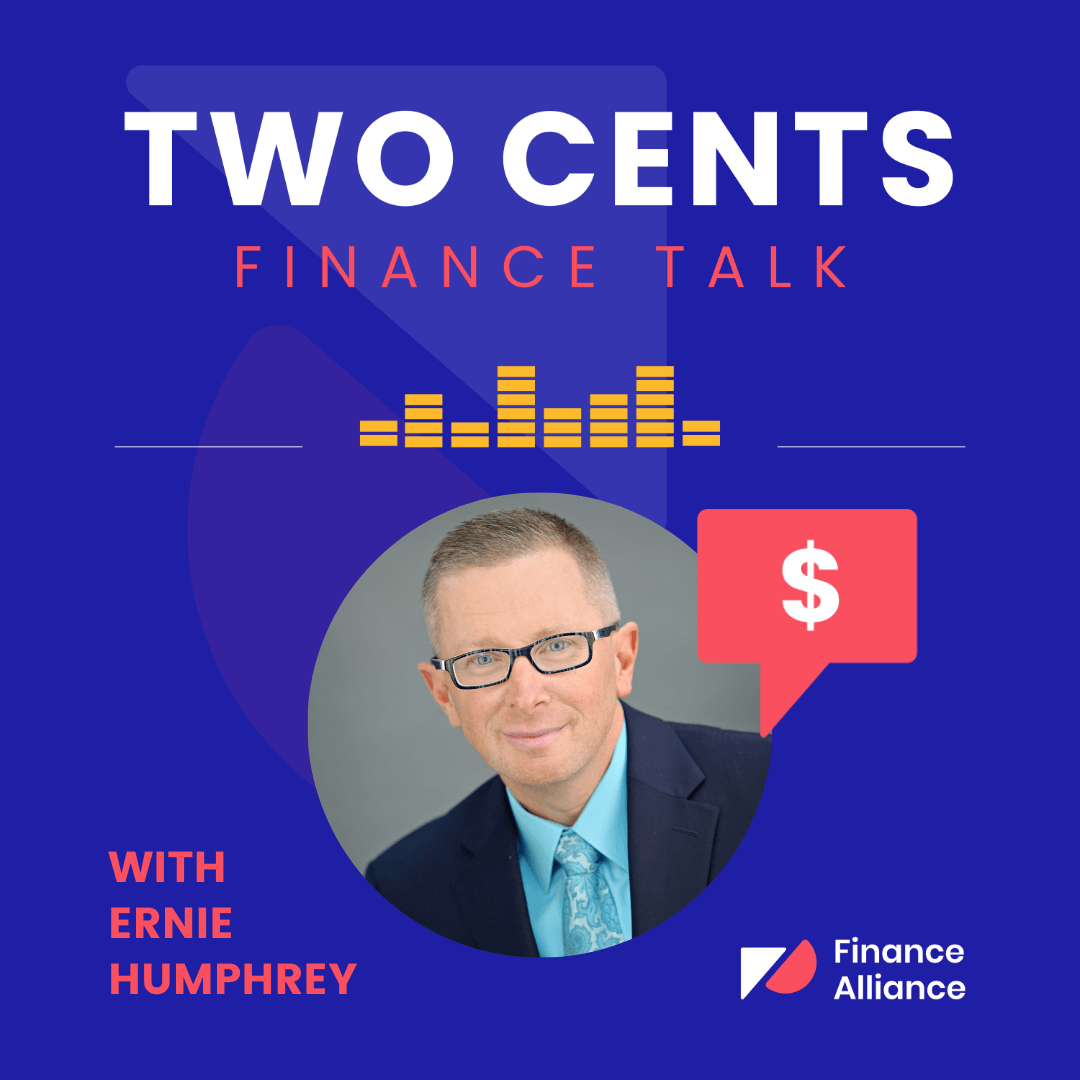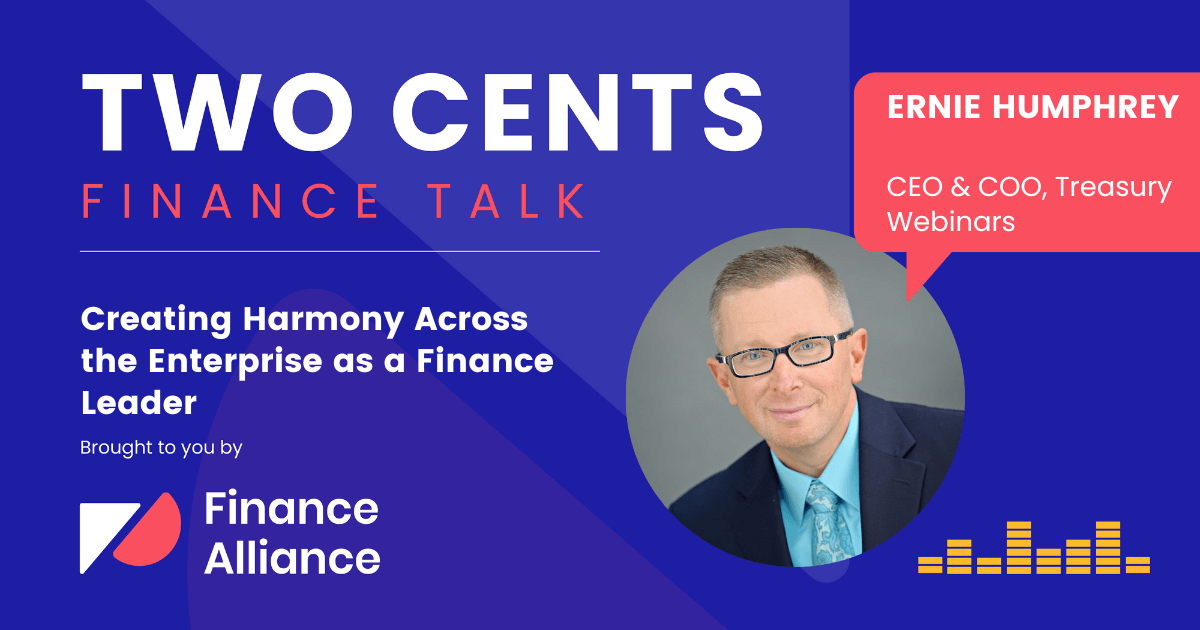Building a strong personal brand can help you stand out from the crowd in today’s highly competitive market. It can also help you establish yourself as an expert in your field, build a long-lasting network of contacts, and increase your visibility and credibility in the industry.
Ernie Humphrey, aka, "The Why Guy” is a renowned specialist in this area and the CEO of Treasury Webinars, a company that empowers treasury professionals to own their own career success.
In our latest episode of the Two Cents podcast, Ernie chatted to us about how to create harmony across the enterprise as a finance leader, as well as:
- The need for companies to control all cash movements
- The challenges associated with AP, AR, and treasury departments all working in silos
- How a treasury manager can break down these silos and effectively collaborate with AP and AR
- How to develop a strong personal brand at work
- How to build relationships with people as an introvert
- Other important tips and takeaways for building your brand
Tune in:
Check out the highlights of our talk with Ernie below.👇
The importance of controlling your cash movements
Q. I've noticed that you post a lot online about the need for companies to control all cash movements. Why are you so vocal about this topic?
I think a big reason for me is that we're seeing all of these words and technology about AI, and there’s all this talk about financial transformation. And I think people make it too complicated.
To me, the biggest impact of financial transformation should be around controlling your cash movements. Being able to predict and control your cash movements is really what gives you strategic agility to deal with all the things you can control and all the things you can't control, like supply chain, inflation, all of those good things.
So, we need to be able to understand the ‘why’ of our movements. And then once we understand why it's happening, we can move towards controlling our movements and giving ourselves a little business agility.
The challenges associated with working in silos
Q.Do you think that AP, AR, and treasury departments all work in silos? If so, why?
I’ve thought that it's been happening for a while, but I've done survey research in each area and asked AP leaders, AR leaders, and treasury leaders if they work in silos. And the vast majority in all areas say that they do.
Working in silos really puts up inherent barriers. So for AP, even working in silos within their own departments limits the control and predictability we have on how and when we make payments, which is obviously crucial with cash going out and making our cash needs and accounts receivable.
I think this has been a bigger focus for every company for the past couple of years.
We have to look at being able to predict when we get paid and then also how we communicate with our customers. And so it's very dangerous for AR to be working in silos and communication with customers and outreach that's not really productive.
And then for folks in Treasury, what we need to do is be able to forecast things and work with AP and AR to understand the why so we don't get in a little silo as well.
When I was in Treasury, we did work in a little bit of a silo, so we really didn't take control of AP. We didn't have a strategy around how we're paying, the type of payments, and things like that. We also didn't have interactions with AR, but there wasn't enough interaction there.
So in regards to working with silos, it's within the departments, but also that culture goes across the enterprise because all of those areas impact the cash conversion cycle.

The true value of collaboration between treasury, AP, and AR
Q. How can a treasury manager break down silos and collaborate with AP and AR?
I talk about these topics a lot when I go to AP conferences. I look at it from their perspective, and I ask them, “Do you collaborate with treasury?”
And then they ask me, “How do I collaborate with treasury?”
So I try and look at it from both sides.
From a treasury perspective, it's about getting everyone to understand the value of collaborating together. Treasury success should be aligned with AP success, so we should be saying, “Hey, accounts payable, you actually have a strategic role. This is the way that you're helping us.”
It can start with, “Hey, I was just on this podcast/I listened to this podcast/I was on a webinar and they were talking about accounts payable and optimizing how we make payments and when we make payments. So I think we should work together.”
So it's about creating that common ground. It’s the same thing on the accounts receivable side. It's like, “Hey, we all want to get paid. But we need to understand the predictability.” So telling them that debt predictability in addition to control gives our company our competitive advantage in this world.
It's about communication, and communication depends on the person. When I was in corporate Treasury, I had to give a presentation on how we manage cash. And we invited the AP and AR people. And afterward, they said, “Wow, I didn't know you guys were doing that.” Then they came up and wanted to learn more.
And also, some people just aren't outgoing. But there's someone in your company that has a relationship with a person that's not outgoing. So you’ve got to connect on a personal level with those folks.
How to build your personal brand at work
Q. You mentioned the value of a strong professional brand and work. How does someone build that brand?
What your brand does is empower you to take ownership of your career. And that's the underlying mission of what I do.
I've spoken to hundreds of CFOs and treasurers, and finance and accounting leaders of all sizes, including Fortune 20 companies. Every person I've asked says their success was fueled by mentorS, colleagues, and professional peers.
A strong brand inspires people to want to work with you. You have to be able to offer them value, to collaborate up and down the ladder, and then across your country.
Another thing I'd like to talk about is that people don't understand the dimensions of your brand. So for your professional brand, you have your value proposition, your resume, your LinkedIn profile, and your network.
And your brand is on display at work. So you have a brand with your co-workers. And then in terms of your professional network, you have to look at that internally. How are you connected with people in your department and across the enterprise?
So that's really looking at your network and thinking about all these things: your departmental colleagues, co-workers, customers, suppliers, peers, banks, and consultants. All these people interact with you, so you need to network with them and get them on your team.
And when it comes to building that network with people you need to get in contact with, I tell people, “Think about it this way. Who do you want to know? Who do you need to know? Who do you already know? Who knows what you want to know? And who needs what you need to know?”
There’s a big answer there, but I'm happy to have a conversation with someone about how to actually do these things because nobody talks about that. Implementing a personal branding action plan is important.

How to build business relationships as an introvert
Q. How does someone that doesn’t classify themselves as an extrovert go about building relationships with people that aren’t known for being friendly?
Part of it is that you have to make yourself do it. You have to be authentic and you have to find what works for you.
Oftentimes, we watch other people and we try and borrow from them, but if you're not a comedic person and you go up to someone and start telling jokes, that's kind of it.
But one of the many great things about introverts is that they listen. So just listen, take opportunities, and also hang out with people that are more outgoing so you can get those natural connections. But it's trial and error.
I think the biggest thing is to be authentic and not be too hard on yourself. I think that's a big part of it. It’s just judging yourself. I’m a big personality. Some people like me, and some don't, and I don't really care if people don't like me anymore. That's just who I am. So you have to be comfortable in your own skin.
And sometimes, you're not going to get a good reaction from someone. They might be having a bad day. But you can't just let it shut you down. You have to give it another try. You have to keep putting the olive branch out there.
And then like I said, if there's someone that you're not connecting with that somebody else knows, you might say, “Hey, John, I'd really like to get to know Mary better. How do I do that?” So those are some of the tips that I share with people.
Closing thoughts
I think for me, the number one thing is that your professional brand matters. That's important. But it's not rocket science. So don't make it too hard.
The other thing is that I'm happy to help people make that journey.
And finally, just realize that you're always on. So make sure you're conscious of whatever your environment is. How you're acting and reacting is all part of your brand. And to this, I always say and I'm not the best at it: Listen, listen, listen.
That's the best career advice anyone can get.
About Ernie

Ernie Humphrey serves as the CEO of 360 Thought Leadership Consulting & Treasury Webinars. Over the past three years, Treasury Webinars has delivered thought leadership webinars to over 15,000 treasury and finance leaders across the globe.
Ernie was a driving force behind Proformative, formerly the largest community of Finance professionals, which grew from 500 to 30,000 during his tenure. He has authored published articles on working capital management, performance management, budgeting & planning, acquisition integration, and bank relationship management in addition to articles dealing with several aspects of professional development.
His e-book focused on career management and was recognized as one of the Top 10 e-books for CFOs in 2018. Ernie was named one of the Top 20 Pioneering CEOs by Tech Magazine in 2020. Ernie has a BS and MS in Economics both from Purdue University.
Resources & mentions from this episode:



 Follow us on LinkedIn
Follow us on LinkedIn




